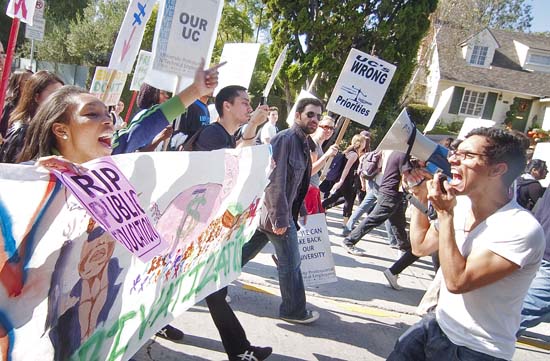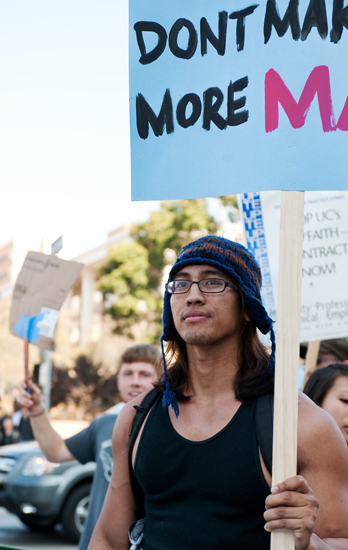
Lorenzo Perillo sat in the middle of the intersection of Wilshire and Westwood boulevards Thursday and refused to move for the red Mazda Miata that beeped at him.
“I’m a pedestrian, you’re in a cross walk,” the world arts and culture graduate student said, shouting.
When Perillo realized the driver of a car worked at UCLA, he asked him to join in on the march.
After streaming through campus in an effort to widen their numbers, Perillo and his fellow protesters had made their way down Westwood Boulevard to protest the 32 percent fee hike discussed by the UC Board of Regents on Wednesday.
“Whose streets? Our streets!” they said, drawing cheers and honks from some students in traffic, construction workers and employees of UCLA Parking and Commuter Services.
“We’re taking it to the streets because this is a public university, so the decision affects everyone in the community,” Perillo said. “It’s important to stress that this is not just a just a student-run, student-led cause. It’s bigger than that. We’re talking about pedagogy, curriculum, the future of education here.”
On Wednesday, the regents’ Committee on Finance approved the 32 percent fee increase, resulting in large-scale protests and demonstrations across campus. The protests continued Thursday, as the full board intended to vote on the issue that day.
On Thursday morning, Perillo was invigorated in spite of the fact that
he had been up late at the makeshift tent city when the buses came in
from UC Berkeley the night before.
“It was really inspiring to see folks from other schools come in and
replenish the protest,” Perillo said. “It was kind of like the cavalry
had arrived, and it renewed the spirit of the strike.”
Carlos Sanchez, a fourth-year legal studies student at UC Berkeley, was one of those students.
He said he endured the bus ride from Berkeley to Westwood out of what he saw as a necessity to ensure his education.
“If we don’t come down here, who will? There’s no half measures,” Sanchez said. “If we have to come down here on a bus, we will. Unity is vital to making any kind of social change. Coming down here is contributing to that.”
After walking down Wilshire, with police on the sidelines observing them all the way, the protesters turned the bend toward Veteran Avenue, to make their way back to Covel Commons, where it had all started Wednesday as students waited on the committee’s vote. Once they heard the regents’ final vote, they rushed to the two parking outlets at Sunset Village in hopes of sitting in and blocking the regents from leaving.
Tiffany Loftin, a third-year American studies and philosophy student at UC Santa Cruz, addressed protesters as police formed a barrier between them and the exits.
“Stay sitting down. Please don’t be violent. If you get arrested, don’t resist,” she said before giving out the number for a legal defense league and suggesting that protesters write it on their arms. “If you get arrested, you know they’re going to take your phones,” she said.
Loftin was part of a UC Santa Cruz delegation of 90 students who had arrived at UCLA by bus at 3 a.m.
She said after seeing footage from Wednesday’s protest and hearing about the experiences of her friends, safety was her foremost priority.
“On the bus ride here, I gave everybody on my bus a copy of their rights. We read it on the way down here,” she said. “It was a six-hour ride, so they almost memorized it. I had friends who got tased and beat because they were out here protesting, just as the amendment to the Constitution allows them to do.”
Around the back of Covel, Travis Lau, a second-year English student, watched as protesters surrounded a white van that they suspected held two regents.
Lau said he didn’t march the streets of Westwood because he believed it veered too much from the original plan of staying at Covel.
“That was something that was very radical and could have gotten us all arrested,” he said. “The hospital is not covered by UCPD but LAPD. Since Covel was our main target, I came back to it.”
As police closed in on the activity, Lau stood awestruck and questioned the effectivity of surrounding the van.
“It’s supposed to be intimidating, but this is dangerous to students. … How many of us are going to be injured or taken away before we get our point across?” Lau said. “I’m worried for my fellow students. I know people who are not politically active and coming out for their first protest ever, and they could get hurt,” he said, straining his voice over the crowd’s shouts of “books, not batons.”
